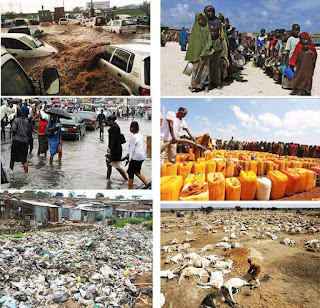The draconian ban on plastics* came in on 28 August 2017, threatening up to four years’ imprisonment or fines of 4M or $40,000 for anyone producing, selling – or even just carrying – a plastic bag.
Plastic carrier, packaging and planting bags were to be replaced with biodegradable bags in the well known Plastic ban in Kenya in a bid to have a cleaner environment as enshrined in the Constitution.
How effective has this bold step been?
First thing first.
What is Biodegradation?
It is the breakdown of organic matter by microorganisms, such as bacteria or fungi.
A process by which microbial organisms transform or alter (through metabolic or enzymatic action) the structure of chemicals introduced into the environment.
The word biodegradable is distinct in meaning from compostable.
1. Biodegradable: An object capable of being decomposed by bacteria or other living organisms. Decomposition need good amount of oxygen to occur.
2. Compostable: Capable of undergoing biological decomposition in a compost site such that the material is not visually distinguishable and breaks down into carbon dioxide, water, inorganic compounds and biomass at a rate consistent with known compostable materials.
3. Plastic: A material consisting of any of a wide range of synthetic or semi-synthetic organic compounds that are malleable (can be molded into solid objects). They decompose over a long period of time; depending on various factors.
4. Biodegradable bags: Bags or wrappers made of polymers or starch that presumable should degrade by biological means faster than plastics. Are capable of being decomposed by bacteria or other living organisms.
And i quote BBC,
"But the bags aren’t always as environmentally friendly as they seem. They’re made from similar petrochemical-based materials to conventional plastic, only with compounds added that cause them to disintegrate gradually in the presence of light or oxygen. They often then degrade into a sludge of toxic chemicals." Here
Plastics and Climate Change
The success and dominance of plastics started in the early 20th century leading to environmental concerns regarding its slow decomposition rate after being discarded as trash due to its composition of large molecules. Most plastics are durable and degrade very slowly, as their chemical structure renders them resistant to many natural processes of degradation.
Polymer degradation takes much longer as a result of saline environments and the cooling effect of the sea.
That is why waterbodies suffer most from plastic disposal.
Plastic Effects On Climate Change
The effect of plastics on global warming is mixed. Plastics are generally made from petroleum. If the plastic is incinerated, it increases carbon emissions; if it is placed in a landfill, it becomes a carbon sink although biodegradable plastics have caused methane emissions, a greenhouse gas.
Magics Of Biodegradables
"Simply calling something biodegradable and not defining in what environment it is going to be biodegradable and in what time period it is going to degrade is very misleading and deceptive." said Ramani Narayan, a chemical engineer at Michigan State University in East Lansing, and science consultant to the Biodegradable Plastics Institute.
QUESTION:
Are the biodegradable planting bags a better alternative?
I do not know.
What i know from experience and experiment is that upon burning the biodegradable bags i realized it burns just like plastics do and take more than 180 days to rot in the soil.
They presumably take 180 days to decompose, do they? According to me, No.
But they are purportedly made of starch, organic materials.
I realized that it doesn't disintegrate any differently faster.
Can you plant seedlings with it, now that it is degrades biologically?
I learnt that when used in raising seedlings, the seedling at the edges of the potbed seem to lose water faster.
During watering, water seeps or leaks slowly through porous material or small holes without reaching the bottom.
NOTE: Despite the introduction of the biodegradable planting bags, even the government forestry agencies still use polybags much after expiry of the extended grace period into late last year. When they should lead in the front!
SHARE YOU EXPERIENCE ON BIODEGRADABLES:
a) Suitability
b) Cost
c) Durability
d) Water efficiency
e) Degradation/decomposition
f) Environmental friendliness etc








